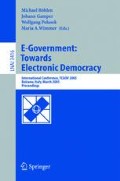Abstract
We present a methodology for proving in Zero Knowledge the validity of selecting a subset of a set belonging to predefined family of sets. We apply this methodology in electronic voting to provide for extended ballot options. Our proposed voting scheme supports multiple parties and the selection of a number of candidates from one and only one of these parties. We have implemented this system and provide measures of its computational and communication complexity. We prove that the complexity is linear with respect to the total number of candidates and the number of parties participating in the election.
Access this chapter
Tax calculation will be finalised at checkout
Purchases are for personal use only
Preview
Unable to display preview. Download preview PDF.
References
Benaloh, J.: Verifiable Secret Ballot Elections. PhD thesis, Yale University (1997)
Benaloh, J., Tuinstra, D.: Receipt-free secret ballot elections. In: Proc. 26th Symposium on the Theory of Computing (STOC), pp. 544–553. ACM, New York (1994)
Cramer, R., Frankel, Y., Schoenmakers, B., Yung, M.: Multi-Authority Secret-Ballot Elections with Linear Work. In: Maurer, U.M. (ed.) EUROCRYPT 1996. LNCS, vol. 1070, pp. 72–83. Springer, Heidelberg (1996)
Crammer, R., Gennaro, R., Schoenmakers, B.: A Secure and Optimally Efficient Multi-Authority Election Scheme. In: Fumy, W. (ed.) EUROCRYPT 1997. LNCS, vol. 1233, pp. 113–118. Springer, Heidelberg (1997)
Paillier, P.: Public-key cryptosystems based on composite degree residuosity classes. In: Stern, J. (ed.) EUROCRYPT 1999. LNCS, vol. 1592, p. 223. Springer, Heidelberg (1999)
Damgraad, I., Jurik, M.: A Generalization, a Simplification and Some Applications of Paillier’s Probabilistic Public-Key System. In: Kim, K.-c. (ed.) PKC 2001. LNCS, vol. 1992, pp. 119–136. Springer, Heidelberg (2001)
Fouque, P.A., Poupard, G., Stern, J.: Sharing Decryption in the Context of Voting or Lotteries. In: Financial Crypto 2000. LNCS. Springer, Heidelberg (2000)
Baudron, O., Fouque, P.-A., Pointcheval, D., Pouparde, G., Stern, J.: Practical Multi-Candidate Election System. In: Proceedings of the ACM Conference on Principles on Distributed Computing, Philadelphia, USA (August 2001)
Fiat, A., Shamir, A.: How to Prove Yourself: practical solutions of identification and signature problems. In: Odlyzko, A.M. (ed.) CRYPTO 1986. LNCS, vol. 263, pp. 186–194. Springer, Heidelberg (1987)
Fujioka, A., Okamoto, T., Ohta, K.: A Practical Secret Voting Scheme for Large Scale Elections. In: Zheng, Y., Seberry, J. (eds.) AUSCRYPT 1992. LNCS, vol. 718. Springer, Heidelberg (1993)
Pedersen, T.P.: Non-Interactive and information-theoretic secure verifiable secret sharing. In: Feigenbaum, J. (ed.) CRYPTO 1991. LNCS, vol. 576, pp. 129–140. Springer, Heidelberg (1992)
Damgard, I., Koprowski, M.: Practical Threshold RSA Signatures Without a Trusted Dealer. In: Pfitzmann, B. (ed.) EUROCRYPT 2001. LNCS, vol. 2045, p. 152. Springer, Heidelberg (2001)
Fouque, P., Stern, J.: Fully Distributed RSA Signatures under Standard Assumptions (2001)
Author information
Authors and Affiliations
Editor information
Editors and Affiliations
Rights and permissions
Copyright information
© 2005 Springer-Verlag Berlin Heidelberg
About this paper
Cite this paper
Dimitriou, T., Foteinakis, D. (2005). A Zero Knowledge Proof for Subset Selection from a Family of Sets with Applications to Multiparty/Multicandidate Electronic Elections. In: Böhlen, M., Gamper, J., Polasek, W., Wimmer, M.A. (eds) E-Government: Towards Electronic Democracy. TCGOV 2005. Lecture Notes in Computer Science(), vol 3416. Springer, Berlin, Heidelberg. https://doi.org/10.1007/978-3-540-32257-3_10
Download citation
DOI: https://doi.org/10.1007/978-3-540-32257-3_10
Publisher Name: Springer, Berlin, Heidelberg
Print ISBN: 978-3-540-25016-6
Online ISBN: 978-3-540-32257-3
eBook Packages: Computer ScienceComputer Science (R0)

